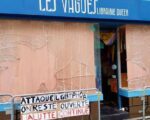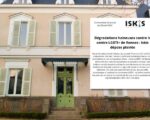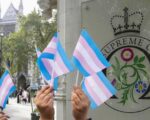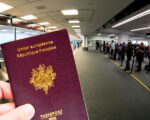Plus d’une centaine d’hommes, âgés de 16 à 50 ans, dont deux journalistes, tous « présumés » ou homosexuels, auraient été kidnappés, torturés ou encore exécutés par les autorités tchétchènes, selon le journal russe d’opposition Novaïa Gazeta, qui évoque un « nettoyage préventif ».
Des rafles collectives donc, en guise de représailles ou d’avertissement, après les demandes d’autorisation de l’association « Gayrussia » d’organiser dans les communes voisines des rassemblements pro-LGBT, mais contrevenant à la loi ratifiée en 2013 contre la « promotion des relations sexuelles non traditionnelles auprès des mineurs ». La police aurait également exploité le smartphone d’une victime pour retrouver les coordonnées d’autres « gays ».
Le porte-parole du leader tchétchène « Ramzan Kadyrov », qui bénéficie par ailleurs du soutien de Vladimir Poutine, a démenti les accusations, criant au « mensonge absolu : il n’y a pas de gays dans la région, alors comment réprimer des gens qui n’existent pas ? » Et si le cas s’avérait, les forces de l’ordre n’auraient pas non plus à s’en inquiéter, leurs proches les enverraient, sans autre vocation, « dans ces endroits d’où l’on ne revient pas ! »
L’information a toutefois été certifiée par plusieurs sources, comme l’a déclarée au quotidien britannique The Guardian Ekaterina L. Sokiryanskaya, coordinatrice, experte de la Russie au sein de l’International Crisis Group : malgrè le manque de preuves tangibles, « le nombre croissant de signalements pousse à croire que ces détentions et violences existent réellement ».
Citant par ailleurs des témoignages, dont le récit d’un adolescent de 16 ans qui a réussi à s’échapper d’un village où il était détenu et battu, le réseau LGBT russe a publié un communiqué, lundi, « préoccupé et choqué » par la réaction et propos des officiels, « justifiant ces assassinats ». L’association a lancé un appel aux victimes, avec des points relais pour les aider à fuir cette République du Caucase, membre de la Fédération de Russie.
Dans un nouveau reportage ce mardi, Novaya Gazeta affirme que les arrestations étaient en cours depuis la mi-février, identifiant un ancien bâtiment militaire situé près de la ville d’Argoun, comme « camp d’emprisonnement ».
Joëlle Berthout
stophomophobie.com
[spacer]
>> Authorities in the Russian republic of Chechnya have launched an anti-gay campaign that has led to authorities rounding up dozens of men suspected of being homosexual, according to the Russian newspaper Novaya Gazeta and human rights activists.
The newspaper’s report, by an author regarded as a leading authority on Chechnya, claimed that more than 100 people had been detained and three men killed in the roundup. It claimed that among those detained were well-known local television personalities and religious figures.
Alvi Karimov, spokesperson for Chechnya’s leader, Ramzan Kadyrov, described the report as « absolute lies and disinformation », basing his denial on the claim that there were no gay people in Chechnya. « You cannot detain and persecute people who simply do not exist in the republic, » he told Interfax news agency.
« If there were such people in Chechnya, the law-enforcement organs wouldn’t need to have anything to do with them because their relatives would send them somewhere from which there is no returning. »
A spokesman for the region’s interior ministry told the Russian newspaper RBC that the report was « an April fool’s joke ».
However, Ekaterina Sokirianskaia, Russia project director for the International Crisis Group, told the Guardian she had been receiving worrying information about the issue from various sources over the past 10 days. « I have heard about it happening in Grozny [the Chechen capital], outside Grozny, and among people of very different ages and professions, » she said.
The extreme taboo nature of the subject meant that much of the information was arriving second or third hand, and as yet there are no fully verifiable cases, she added. « It’s next to impossible to get information from the victims or their families, but the number of signals I’m receiving from different people makes it hard not to believe detentions and violence are indeed happening. »
Chechnya is formally part of Russia, but functions as a quasi-independent state in which the word of Kadyrov often seems to transcend Russian laws. He has overseen the rebuilding of the republic with Moscow’s money, after two devastating wars. Kadyrov has at various times endorsed polygamy, compulsory wearing of the hijab for women in public places, and collective punishment for the relatives of those involved in the Islamist underground.
Chechen society is strictly conservative, meaning that unlike other cases where relatives or rights activists may put pressure on authorities when a homosexual relative disappears, those suspected are likely to be disowned by their own families. Locals say that if a family was known to have a gay member, other relatives would find it difficult to marry due to the « shame ».
Attitudes to LGBT rights are mixed in Russia, with an infamous law banning the « propaganda of homosexuality among minors » on the books. But Moscow and other big cities have a thriving gay scene, even if much of it remains underground. In Chechnya and the other Muslim republics of the North Caucasus, there is no discussion of the issue, and gay men do not even tell their closest friends of their orientation.
The Novaya Gazeta article claimed that three people had been killed, and suggested others could have been handed to their families with the expectation that the family would perform an honour killing.
An LGBT rights organisation in St Petersburg has set up an anonymous hotline for gay people in Chechnya to seek help with evacuation from the republic. After years of threats and repression, almost no independent journalists or rights activists are able to work in the region, and those who do work on human rights in the republic dismissed the newspaper report.
« I haven’t had a single request on this issue, but if I did, I wouldn’t even consider it, »Kheda Saratova, a Chechen activist who is on Kadyrov’s human rights council, told a Russian radio station. « In our Chechen society, any person who respects our traditions and culture will hunt down this kind of person without any help from authorities, and do everything to make sure that this kind of person does not exist in our society. »

















